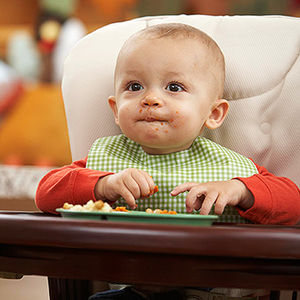Every 4 month well child check includes the same conversation; when is it time to start solid foods? There is no one answer to this question and the answers, at least some of them, have changed quite a bit over the years. The recommendation from the American Academy of Pediatrics that has remained constant is that babies should exclusively breastfeed for the first 6 months of life, and then introduce solid foods around 6 months old. However, not all babies are exclusively breastfeeding up until 6 months of age and some babies are really hungry and ready for foods prior to that time. I counsel parents that between 4 and 6 months of age, babies develop the muscular strength to eat solid foods, the interest in food, and the ability to digest it. Look for your baby’s ability to hold their head up and also for their interest in your food when you eat. If you start before 6 months of age, keep in mind that your baby is not ready to decrease their breast milk or formula intake. It is not recommended to give babies younger than 4 months of age solid foods and never give your baby honey or anything they can choke on.
When you are ready to start, here are 8 tips you need to know:
- Start with foods that are pureed so that your baby can easily take the food in until they learn to chew. Watch for the tongue thrust that babies need to nurse, as this will cause them to push the food or spoon out of their mouths. If this occurs, stop the feeding and wait until they are a little older. Otherwise you will just end up with a mess.
- You can give foods in any order. There is no evidence that giving vegetables first will make your baby less picky when they get older or that giving cereal first will be better tolerated.
- Give foods high in zinc, iron and other nutrients like pureed meats, beans, vegetables or cereals. (I know what I said in number 2, but cereal is still an option.) Fruits are also an important early food to introduce but not necessarily the very first foods.
- Don’t rely solely on rice cereal if you choose to give cereal because of the amount of arsenic in rice. You can give oatmeal or barley or others grains in addition to rice.
- Give peanut butter early and often. Since the LEAP (Learning Early About Peanut Allergy) study was released it has become clear that early introduction of peanut prevents peanut allergy. However, high risk babies, like those with severe eczema, should be tested for peanut allergy first. For a breakdown on who needs to be tested, click here. Make sure to water down creamy peanut butter, or mix into pureed banana or cereal, so as to avoid choking.
- Give single ingredient foods one at a time. I usually recommend giving a new food a try for a few days in a row before switching to another new food. This is one of those “we’ve always done it this way but we don’t have evidence to back it up” recommendations. Even so, if you give several new foods at once and your baby has a reaction, it makes it harder to narrow down the cause.
- Babies are ready for finger foods when they are sitting well, perfecting their fine motor skills and showing signs of being able to chew. This usually occurs around the 8 month mark. Once babies can eat soft finger foods, you can give cooked eggs, well cooked pasta or rice, cheese or cottage cheese, and any other food they have already had as a puree. Make sure foods are small and soft to avoid choking and don’t give anything with honey.
- Babies in the second half of the first year of life who are eating solids are ready to learn how to use a sippy cup. They also need to drink water to help with digesting their food. There is no nutritional reason to give juice and I generally advise against juice for babies.
If you have questions about your baby’s readiness for solids or what foods your baby should have, ask your pediatrician.



